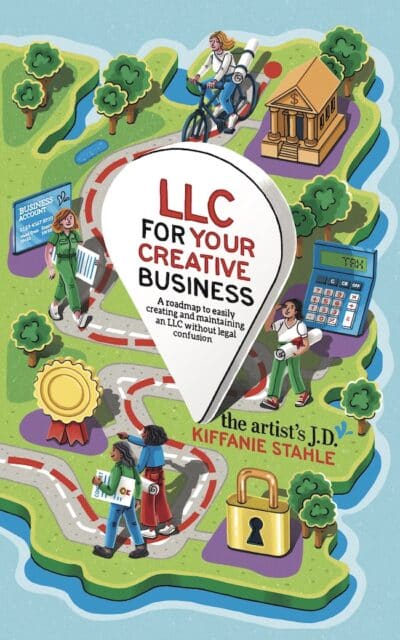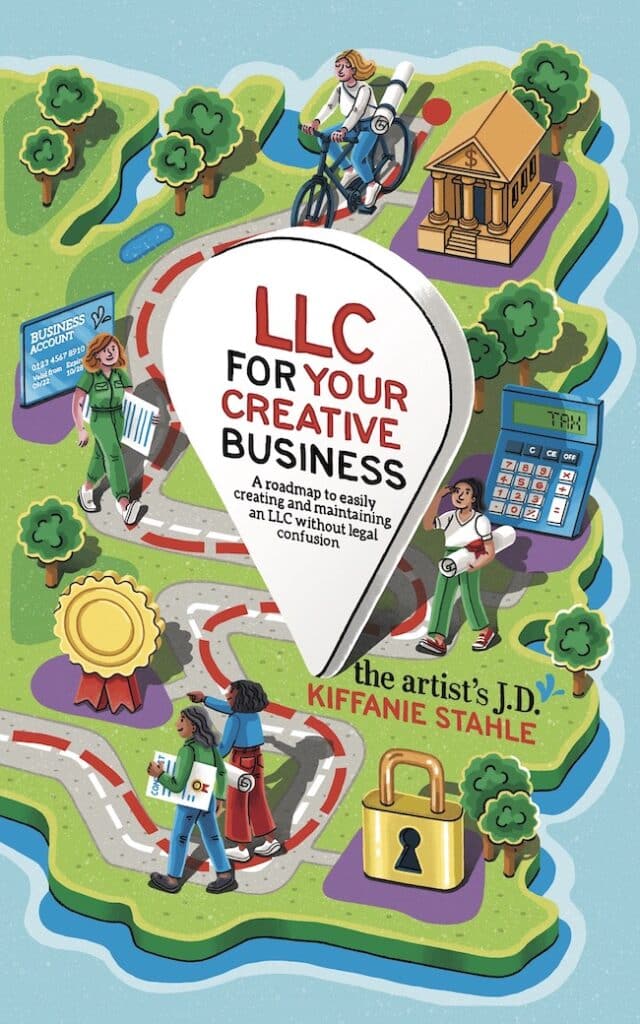How much money does your business need to be making before it’s time to become an LLC? Can you create an LLC if you aren’t financially stable?
That’s what we are covering in this week’s episode of Ask Kiff.
The short answer is that financial self-sufficiency isn’t a legal requirement to become an LLC. But the LLC does need enough money to survive.
To do that, you’ll do two things:
- make sure the LLC starts off with 3-6 months of expenses in your accounts
- only pay yourself when the LLC accounts have enough to cover the regular expenses
Watch the video | Read the show notes | Read the transcript
Show notes
- I have my LLC bank accounts at Novo. Use this link to open an account and we both get $40!
- Curious what other tasks you should be doing to keep your LLC’s fence strong? Then check out this free guide.
- Curious about the concept of Profit First? Here’s the book that explains it. (< affiliate link)
- The concept of giving dollars jobs, I learned from YNAB. It’s my favorite software to budget and keep track of the money coming in and going out of my business. Learn more about it here. (< affiliate link)
- Learn more about the artist’s Courtyard membership community here.
Are you overwhelmed by the legal jargon associated with creating an LLC for your creative business?

Do you wish you had a straightforward roadmap to feel confident that you created your LLC right (and know the expectations to keep it legit)? Then this is the book for you!
When you buy LLC for Your Creative Business, you’ll get my step-by-step guidance through the process of creating and maintaining an LLC for your creative business without all the legal confusion.
(If you use the above Amazon affiliate link, I’ll make a small commission, but it doesn’t change the price you pay.)
Transcript
In this week’s episode of Ask Kiff, I’m covering the biggest mistake that most LLC owners make. It’s one that unintentionally pokes a ton of holes in your fence. And means that your LLC status is only a piece of paper and not what you actually intended it to be.
Hi, I’m Kiffanie Stahle, founder of the artist’s J.D. A place designed to add ease to the legalese running your creative business.
Today’s question comes to us from Susan in Texas. She asks,
Does my business need to be financially self-sufficient before becoming an LLC?
The short answer is no.
There are many businesses who are LLCs from day one. Before they have a penny in revenue coming in. So those businesses aren’t financially self-sufficient and it’s totally okay for them to be an LLC.
There are other businesses that will operate for a while and then transition into an LLC structure. And for those businesses they also might not be making a ton of money.
Remember the reason we’re creating an LLC is to put that fence up between our personal life and our business life.
So while financial self-sufficiency isn’t a requirement to put up that fence, what is the requirement is that we make sure that the LLC has enough money and equipment to run the day to day operations.
When we create an LLC and we put up that fence, we create kind of a fake legal person.
he LLC becomes its own legal entity.
And because of that, we as the owners in an LLC need to invest in the LLC enough money and equipment to make sure the LLC can run its day to day operations.
So in our hat as owner of an LLC, or in legalese a member of an LLC, all we’re entitled to are the profits of the business.
And so if you become an LLC, you can’t treat it like your own personal piggy bank. And take money out when you need it to pay your bills if the LLC doesn’t have enough to pay its own bills.
When that happens there’s the legalese term of “piercing the corporate veil” or as I like to describe it: you start punching holes in your fence.
When you do this, you make it so that your LLC is an expensive piece of paper. And there really is no LLC status anymore.
So there are two things you’re going to do to make sure that you don’t make this mistake.
Start your LLC off on the right foot
The first thing you need to do is to make sure you initially invest enough in your LLC.
What do I mean by this?
If you are already in business
If you already are running a business, you have a pretty good idea of what your expenses are each month. And what income you are making each month.
So what I would encourage you to do is figure out what your:
- most expensive months cost
- least income months bring in
And then calculate the difference between the two numbers.
Say in your most expensive months, it costs $5,000 to run your business. And in your least income months, you’re only making $3,000. That’s a $,2000 difference.
Then take that difference and multiply it either by three or five.
So in our example, $2,000 times three would be $6,000. And $2,000 times five would be $10,000.
And you want to make sure by the time you transfer your existing bank accounts into the LLC’s name that there is somewhere between $6,000 and $10,000 in those accounts.
And if there’s not you are going to take money out of your own personal accounts and make up the difference, so that the LLC has enough money to run in your worst months.
If you are just starting your business
If you have a brand new business, then you have to estimate what your monthly expenses are going to be.
Once you know that, you are going to multiply it by 4 or 6. And you’re going to invest that much into your business from day one.
Because for those first few months you’re probably not going to be making much revenue, and so you need to assume that you are having expenses with $0 in revenue coming in.
So the first thing you’re going to do is make sure that you’re investing enough in the LLC so that it can run in your worst months.
You get paid from the business profits
The second thing you need to do is make sure you’re only paying yourself from the profits of the business.
So that means that you need to always keep it that 3-month minimum amount in your LLC’s bank account.
And you can only pay yourself if your bank account is above that number.
Once you get to a point where you’ve always got this, then I would encourage you to check out the book, Profit First.
It’s something that’s totally revolutionized my way of thinking about how I pay myself.
And encourages you for every dollar coming in, to take a certain number of cents and put them into separate accounts. (Or to assign them different jobs.)
- Some money that comes in goes into your profit account into your reinvestment in your business account.
- Some of it goes into your pay your taxes account.
- Some of it goes into your operating expenses.
- And some of that goes to being able to pay yourself.
And if you follow this formula, your operating expenses are never more than 20 to 25 percent of the revenue coming in, so you’re always going to have profits and be able to pay yourself.
So you’re only going to be able to pay yourself if you’ve got that bare minimum in your accounts. You’ll pay yourself out of the LLC accounts if there are enough profits in those accounts, money up above and beyond what’s necessary for the LLC to conduct day to day operations.
It can be overwhelming to know exactly what’s expected to keep your LLC on the legal up and up

Creating an LLC isn’t:
- as simple as shipping off a form
- a set-it-and-forget-it thing
- a magic bullet to prevent all liability
This book is designed to guide you step by step through the process of making sure your LLC fence remains strong–especially when you need it most.
(If you use the above Amazon affiliate link, we’ll make a small commission, but it doesn’t change the price you pay.)

Hi! I’m Kiff! I’m your friendly legal eagle (and licensed attorney).
My goal is to add ease to the legalese. And because I think basic legal resources should be available to every creative, I create a lot of free content.
If I’ve created something that has helped inject a little ease into your creative business and you would like to say “thank you”, you can make a contribution here.
If you’d like to hear more from me, I’d love to pop into your inbox every Friday morning to share additional ways to cut through the red tape and inject a little ease.
Get tips from your friendly legal eagle in your inbox…
Your privacy is important to us. Learn how we protect it here.

